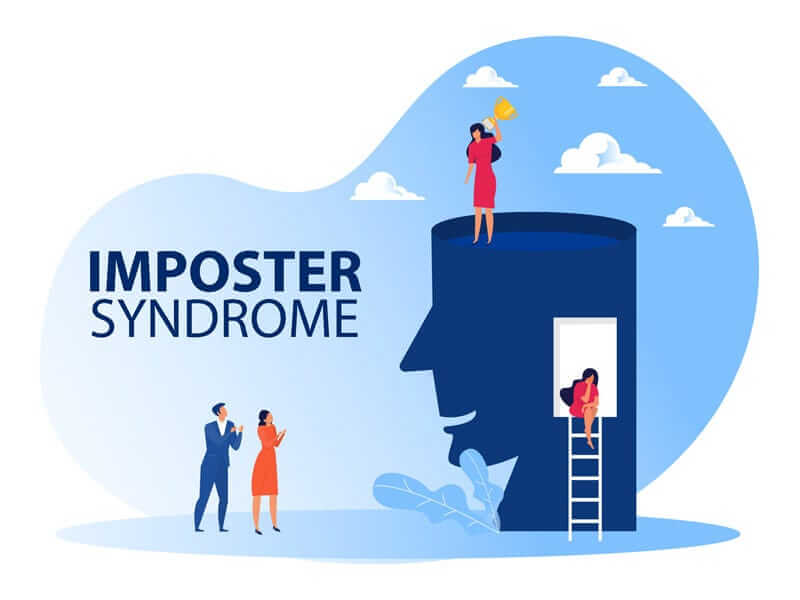Finding your tribe and your people in this vast mosaic of cultures and personalities is a true challenge if I’ve ever seen one. Now, I cannot come and do it for you; that much is true. Nor can I sit here and simply offer condolences with the false promise of understanding everything you’re going through. I mean, I can, but I don’t want to be that kind of person. What I do want to do, however, is offer some advice that will help you approach this journey and make Canada your new home easier. Let us get into how you can navigate the social landscape, find friends who resonate with your vibe, and truly fit in without losing your sense of self. It’s about building connections that feel genuine and overcoming that nagging voice of imposter syndrome that tells you you’re not quite where you belong. Welcome to Canada; let’s make it feel like home.
Imposter Syndrome Definition: What Is It?
The Great Maple Leaf Pot, Canada, is no stranger to immigrants. I do not want to state the obvious and point out how man is a social animal. It is undeniable that since the dawn of civilisation, we’ve been bonding, connecting, and forging relationships. Whether it’s huddling around a campfire or sharing memes on the internet, we thrive on companionship. It’s in our DNA! And let’s face it, life’s just better when you’ve got a squad to tackle it with.
But what happens when you find yourself in a whole new world, far from the comfort of your familiar crew? You see, being the new kid on the block can be daunting, whether you’ve landed in a different city or a whole new country. A new country has its own unique culture, climate, and customs. Now, imagine you’ve just nailed something big—it could be landing your dream job, getting praised by your boss for a project well done, or maybe you’ve just made your first perfectly non-soggy poutine. But instead of basking in the glory of your achievement, your brain goes, “Psst, hey buddy, you don’t actually deserve this, do you? Any moment now, they’ll find out you’re a fraud.”
That’s really as close to an imposter syndrome definition as we can get without making it too Wiki-worthy. Imposter syndrome is like having a tiny, annoying version of yourself whisper doubts and fears, convincing you that you’re just winging it, and soon, the whole world will discover you’re not the real deal. It doesn’t matter how many trophies you’ve got on your shelf or accolades under your belt; this little voice just doesn’t know when to quit. Being in a new country gives you the same feeling. Imagine having to tackle it all in a completely new place and constantly feeling like you need to be on guard. Newcomers in Canada frequently encounter “imposter syndrome” as they adjust to new work environments and team cultures. Welcome to the club; we’ve got jackets. (Not really, but it’s a comforting thought, right?)
Tell-Tale Signs, You’ve Got It

Recognising the signs of imposter syndrome is the first step to overcoming imposter syndrome. If you recognise these signs in yourself, it’s important to understand that imposter syndrome is a common experience shared by many successful individuals. Acknowledging these feelings is the first step towards overcoming them and building a more confident and assertive professional identity.
Here are some key imposter syndrome types that may indicate you’re dealing with this:
The Luck Factor
You’ve got the job, the accolades—maybe even a shiny trophy or two—but deep down, you’re convinced it’s all because of luck, timing, or because someone in HR was having a really off day. It’s never about your skills or hard work, right? It’s always, “Oh, the stars just aligned,” or “I was just in the right place at the right time.”
When you attribute your success to external factors despite being a very skilled professional, know that it’s a sign. This includes the fact that you don’t acknowledge your own skills and hard work. This pattern persists regardless of the number of promotions or the amount of positive feedback you receive.
The Doubt Monster
Constantly questioning your decisions and hesitating to act on your beliefs due to a lack of confidence in your expertise and knowledge is a classic sign of imposter syndrome. You must love to second guess every decision you make and undervalue your own smarts and expertise.
The Perfectionist Critic
Another sign of imposter syndrome is the habit of having a magnifying glass out that mainly works only on failures and discredits all achievements. You could work yourself to the bone, but this voice will say, “Sure, but what about that typo on page 37?” Being overly critical of your work is never healthy; this way, you always feel like you’re never doing enough or that your efforts are always lacking.
The “They’re Gonna Find Me Out” Fear
Feeling a sense of fear that you’re going to be found out any day is another sign. You could be pretty good at what you do, maybe even great, but there’s this nagging fear of being unmasked as a total fraud. “One of these days,” you think, “they’re all going to figure out I’m just faking it.” A pervasive worry that others will discover you’re not as competent or knowledgeable as they think is a common symptom. This fear can lead to anxiety about your performance and the sustainability of your success despite evidence of your capabilities.
The High-Stakes Gambler
Unrealistic standards and fear of failure, like setting impossibly high standards for yourself and fearing any shortcomings against these benchmarks, can indicate imposter syndrome. You set the bar so high that even pole vaulters are like, “That’s a bit much, don’t you think?” You’re playing a constant game of ‘beat your own high score,’ and anything less than perfect is a fail in your books. This often results in overworking and added stress due to a relentless pursuit of perfection and a deep-seated fear of failure.
The Teflon Trophy Case
Dismissing your achievements is an apparent sign of imposter syndrome. Even when you meet or exceed your own expectations, it might not be enough to dispel doubts about your abilities. Successes may be viewed as flukes or lucky breaks rather than the result of your effort and talent, perpetuating the cycle of self-doubt. No matter how many wins you rack up, none of them seem to stick. You’re convinced it’s all part of the grand illusion of being successful, and at any moment, someone’s going to pull back the curtain and reveal the real you.
The Criticism Amplifier
Being overly affected by constructive criticism and focusing solely on negative feedback can reinforce feelings of inadequacy. This sensitivity often leads to a skewed perception of your skills and contributions, further entrenching feelings of being an imposter. Positive feedback? Psh, that just slides right off. But constructive criticism? That gets amplified to concert-level decibels in your head, confirming all those niggling doubts about not being good enough.
The Expertise Underplayer
Avoiding opportunities to share your knowledge or insights for fear of being judged or discredited is another sign. Sharing your knowledge feels like walking a tightrope without a net. “What if they question me?” “What if they laugh?” So, you keep your brilliance under wraps because being in the spotlight feels like setting yourself up for a fall. Doubting your own expertise, even when others seek your guidance, can prevent you from fully participating in collaborative environments or leadership roles.
Why It Hits Newcomers In Canada Harder?

Adapting yourself to a new country is more than just adapting; it’s a tricky balance to walk. You don’t completely change yourself, but don’t be so rigid that it becomes hard for genuine people to be around you, too. Whether you’re here for the poutine, the politeness, or the pursuit of your dreams, it’s exactly this balance that makes imposter syndrome so apparent in newcomers to the country.
Pressure to Prove
The pressure to prove oneself is immense when starting a career in an unfamiliar work culture. This is especially true for individuals who had established careers in their home countries but now face the daunting task of revalidating their qualifications and skills in a new context.
Fear of Failure
The fear of failure can become particularly pronounced as newcomers navigate a myriad of new pressures. Learning a new language, understanding and integrating into a different culture, and establishing a career in an unfamiliar environment can be overwhelming, especially without the close support of family and friends. This sense of isolation can exacerbate the feeling of being an ‘imposter,’ as the struggle to adapt and connect with new coworkers might leave one feeling more like an outsider.
Cultural Differences
Newcomers might find themselves feeling alienated due to cultural differences, compounded by the lack of an established social network that can offer support and reassurance. Moreover, minorities and members of underrepresented communities may face additional challenges that make them more prone to experiencing these feelings of self-doubt and fraudulence.
Work Culture
This can include how performance is reviewed and appreciated, which might be entirely different, leading to doubts about the validity of positive feedback and further fueling self-doubt.
Self Assessment
Many newcomers come from cultures where self-promotion and the explicit listing of one’s accomplishments are not the norm. Being thrust into a system that requires a regular inventory of one’s achievements and contributions can be a daunting experience. This shift can trigger deep feelings of inadequacy and self-doubt as individuals grapple with the task of self-evaluation, further entrenching the sense of being an imposter in their new professional environment.
Effect On Workplace Success
Imposter syndrome can be a real party pooper at work. Picture this: you’re acing your tasks, your desk is a Pinterest-worthy workspace, and yet, there’s this little voice in your head, whispering sweet nothings like, “You’re way out of your league, buddy.”
The impact of such feelings aligns well with the signs of imposter syndrome. Here are some of them:
-
- Constant performance anxiety feels like an endless “Whose Job Is It Anyway?” episode—efforts never seem enough, draining job satisfaction and hindering co-worker connections.
- The “staying hidden” approach is adult hide and seek, avoiding opportunities. Dodging meetings and projects keeps you off the radar but hinders career growth.
- Aiming for perfection can lead to chasing impossible standards, causing burnout. High goals are good, but unrealistic goals can leave you exhausted and unproductive.
- Imposter syndrome can distort performance reviews, making you undervalue achievements and potentially miss out on promotions and skill development.
- Low self-esteem can make networking feel daunting, fearing exposure as a “fraud” or underselling yourself, preventing others from seeing your true value.
10 Strategies To Overcome Imposter Syndrome As A Newcomer
If you’re wrestling with that sneaky imposter syndrome, fear not! Here are 10 handy tips for overcoming imposter syndrome at work and boosting your confidence, Canadian-style.
Reality Check
First things first, those gnarly feelings of not being good enough? They’re as real as a Canadian palm tree. Remember, imposter syndrome is all smoke and mirrors, tricking you into doubting your worth. Next time it whispers sweet nothings of doubt, tell it to take off, eh?
You’re Not Flying Solo
Feeling like an imposter isn’t exclusive to you; it’s a massive party, and guess what? About 82% of people are on the guest list. Knowing you’re in good company can make these feelings a tad easier to navigate.
Value Your Victory
Think back to those early career days when everything felt like climbing Mount Logan. Now, tasks that used to make you sweat are a walk in Stanley Park. Don’t undersell your skills just because you’ve become a pro; remind yourself of your worth, maybe even in loonies and toonies.
Trophy Cabinet
Keep a running tally of your wins, both big and small. When the doubt demons come knocking, whip out your list of achievements like a hockey stick and show them who’s boss.
Cut Yourself Some Slack
Setting the bar sky-high for yourself? Time to lower it to a more Canadian, reasonable height. Not every task needs a Gordie Howe hat trick; sometimes, just getting the puck in the net is enough.
Positive Puck Handling
Find yourself in a spiral of negative noggin chatter? Block those shots with some positive affirmations. Think of them as your mental hockey pads, keeping the negativity pucks at bay.
Buddy System
Find a mentor, eh? Someone who gets the game and can give you a reality check when you’re feeling more like a benchwarmer than a star player. A good heart-to-heart with a trusted colleague can work wonders.
Find Your Crew
Canada’s a tapestry of cultures, but sometimes, your immediate circle might not reflect that. Seek out pals or peers who share your background; it’s like having your own cheering section in the stands.
Embrace the Challenge
See a daunting project on the horizon? Lace up your skates and dive in. Tackling new challenges is like hitting the gym for your confidence; it only makes you stronger.
Call in the Pros
If imposter syndrome has you in a headlock you can’t shake, it might be time to tag in a mental health coach. There’s no shame in seeking a bit of extra support to get you back in the game.
New Roots, New Confidence
Imposter syndrome doesn’t just mess with your head; it can throw a real wrench in everything that makes life joyful. But remember, the first step to beating it is calling it out. Overcoming imposter syndrome at work or simply overcoming imposter syndrome is not impossible, and I know you can do it. Who knows, maybe one day you can all look back at this and laugh – preferably at a company party where you’re being celebrated for being the awesome, non-imposter professionals you truly are.
You May Also Read
|
Guide To Living in Barrie |
|
|
Know The Places To Live in Alberta |
|
|
All About Pet Adoption in Toronto |
|
|
Upgrade Living Room Decorating Ideas |
Frequently Asked Questions (FAQs)
To fix imposter syndrome, it's key to challenge negative thoughts by recognising and celebrating your achievements and seeking support from mentors or professionals when needed.
Imposter syndrome is not a toxic excuse but a psychological pattern where individuals doubt their accomplishments, often needing understanding and strategies to overcome it.
The 4 P's of Imposter Syndrome are Perfectionism, Procrastination, Paralysis (due to fear of failure), and Placating (seeking validation from others). How do you fix impostor syndrome?
Is imposter syndrome just a toxic excuse?
What are the 4 P's of imposter syndrome?











